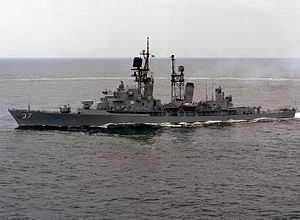Farragut-class destroyer (1958)
 USS Farragut (DDG-37) | |
| Class overview | |
|---|---|
| Name: | Farragut class destroyer |
| Builders: |
Bethlehem Steel Quincy Puget Sound Naval Shipyard San Francisco Naval Shipyard Philadelphia Naval Shipyard Bath Iron Works |
| Operators: |
|
| Preceded by: | Forrest Sherman-class destroyer |
| Succeeded by: | Charles F. Adams-class destroyer |
| Built: | 1957–1961 |
| In commission: | 1959–1993 |
| Completed: | 10 |
| Retired: | 10 |
| General characteristics | |
| Type: | Destroyer |
| Displacement: | 4,167 tons (standard) 5,648 tons (full load) |
| Length: | 512.5 ft (156.2 m) |
| Beam: | 52.3 ft (16 m) |
| Draught: | 17.8 ft (5.4 m) |
| Propulsion: | 2 shaft 2 Allis-Chalmers turbines 4 each 1,200 Pound forced draft Babcock and Wilcox D-type super heated boilers 85,000 shp (63,000 kW) |
| Speed: | 32 knots (59 km/h) |
| Range: | 5,000 nmi (9,000 km) at 20 knots (37 km/h) |
| Complement: | 360 |
| Sensors and processing systems: | 1 AN/SPS-10 surface search RADAR[1] 1 AN/SPS-37 air search RADAR[1] (AN/SPS-49 in Mahan from 1981) 1 AN/SPS-39 3D air search RADAR[1] (AN/SPS-48E in Mahan from 1981) 1 AN/SPG-53 gun fire control RADAR[1][2] 2 AN/SPG-55 Terrier fire control RADAR[1][3] AN/SQS-23 SONAR[4] |
| Armament: | 1 × Mark 10 Launcher Terrier SAM (SM-2ER in Mahan from 1981) 1 × 5in (127 mm) 1 × ASROC Launcher 6 × 12.8in (324 mm) ASW TT 8 × Boeing Harpoon SSM (After third update) |
The Farragut class was the second destroyer class of the United States Navy to be named for Admiral David Glasgow Farragut. The class is sometimes referred to as the Coontz class, since Coontz was first to be designed and built as a guided missile ship, whereas the previous three ships were designed as all-gun units and converted later.[5]
Ten Farragut-class ships were ordered between 1955 and 1957. Each ship displaced 5,800 tons under full load, with a length of 512 feet (156 m), a 52-foot (16 m) beam and a top speed of 33 knots (61 km/h). Originally commissioned as guided missile frigates (DLG), they were redesignated as guided missile destroyers (DDG) under the fleet realignment in 1975. They were also the only redesignated ships to be renumbered as well under the realignment, with the first unit changing from DLG-6 to DDG-37 and all subsequent vessels being renumbered upwards in order.
All ships of the class were decommissioned between 1989 and 1994 and subsequently scrapped.
Ships in class
| Name | Number | Builder | Launched | Commissioned | Home port | Status |
| Farragut | DDG-37 | Bethlehem Steel Corporation | 18 July 1958 | 10 December 1960 | Decommissioned 31 October 1989 | |
| Luce | DDG-38 | Bethlehem Steel Corporation | 11 December 1958 | 20 May 1961 | Decommissioned 1 April 1991 | |
| Macdonough | DDG-39 | Bethlehem Steel Corporation | 9 July 1959 | 4 November 1961 | Decommissioned 23 October 1992 | |
| Coontz | DDG-40 | Puget Sound Naval Shipyard | 6 December 1958 | 15 July 1960 | Decommissioned 2 October 1989 | |
| King | DDG-41 | Puget Sound Naval Shipyard | 6 December 1958 | 17 November 1960 | Decommissioned 28 March 1991 | |
| Mahan | DDG-42 | San Francisco Naval Shipyard | 7 October 1959 | 25 December 1960 | Decommissioned 15 June 1993 | |
| Dahlgren | DDG-43 | Philadelphia Naval Shipyard | 16 March 1960 | 8 April 1961 | Decommissioned 31 July 1992 | |
| William V. Pratt | DDG-44 | Philadelphia Naval Shipyard | 6 March 1960 | 4 November 1961 | Decommissioned 30 September 1991 | |
| Dewey | DDG-45 | Bath Iron Works | 30 November 1958 | 7 December 1959 | Decommissioned 31 August 1990 | |
| Preble | DDG-46 | Bath Iron Works | 23 May 1959 | 9 May 1960 | Decommissioned 15 November 1991 |
The fictional USS Bedford was depicted as a Farragut-class destroyer, using a large model ship, in the 1965 Cold War film The Bedford Incident.
See also
- Farragut-class destroyer (1934)
- List of United States Navy destroyer leaders
References
- ↑ 1.0 1.1 1.2 1.3 1.4 Blackman, Raymond V. B. Jane's Fighting Ships (1970/71) p.432
- ↑ Polmar, Norman "The U.S. Navy: Shipboard Radars" United States Naval Institute Proceedings December 1978 p.145
- ↑ Polmar, Norman "The U.S. Navy: Shipboard Radars" United States Naval Institute Proceedings December 1978 p.144
- ↑ Polmar, Norman "The U.S. Navy: Sonars, Part 1" United States Naval Institute Proceedings July 1981 p.119
- ↑ DLG 6 / DDG-37 Farragut / DLG 9 Coontz
External links
-
 Media related to Farragut class destroyers (1958) at Wikimedia Commons
Media related to Farragut class destroyers (1958) at Wikimedia Commons - Farragut-class frigates at Destroyer History Foundation
| ||||||||||||||